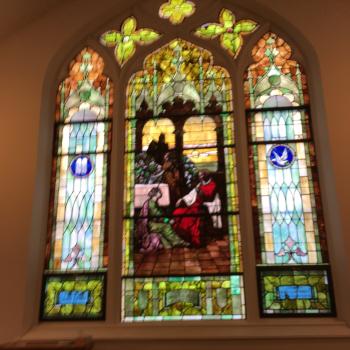I was the lector at mass this morning and first while preparing and then when giving it, I was struck by the opening of the reading from the book of Exodus:
You shall not molest or oppress an alien, for you were once aliens yourselves in the land of Egypt. (Ex 22:20)
This charge to the ancient Israelites seems equally applicable to Americans, since each of us (with the exception of the small handful of native Americans among us) is descended from aliens: people who immigrated to the United States. Some of our ancestors came long enough ago that “documentation” meant getting a ticket; others came after immigration rules began to tighten during one of the periodic waves of xenophobia in the 20th century. Some came legally, some came illegally, and others fell into gray areas. (Shake your family tree sometime and see what falls out. I was surprised as an adult to discover that my father only became a legal resident years after entering the country; my wife’s grandfather, a Ukrainian, was an undocumented immigrant to the day of his untimely death.) So the injunction is upon us: mindful of how our ancestors were treated (and often mistreated), today we as a nation need to respect the human dignity of the “aliens” among us.
In most places in the US, but especially in major urban centers, immigrants are all over the place: the Sikh who runs the 7-11, the Central Americans who work on the lawn crew, the Polish woman who cleans your office at night, the Irish waiter at the local restaurant, the Chinese cook at the take-out place in the mall. And you really cannot tell, looking at them, which ones are legal and which ones are not. Here in the Northeast there have been innumerable Irish and Polish who come on tourist visas but stay to work. And in a given Mexican-American family you can have a confusing melange of people with work permits, people with permanent residency, people without papers (“illegals”) , naturalized citizens and natural born American citizens. An undocumented immigrant might have lived in this country for years or even decades, paying taxes and raising a family—seemingly the perfect neighbor and a “good citizen.”
Contrast this complex reality with the demonisation that underlies the recent spate of laws oppressing illegal immigrants, most recently the draconian law passed in Alabama. The law gives police permission to question anyone “suspicious” during routine traffic stops about their immigration status. Towns are prohibited from “transacting business” with illegal immigrants—as a result, in some towns they cannot pay their water bills and will have their water and sewer service cut off. Even schools are dragged in:
Cineo Gonzalez was shocked a few weeks ago when his six-year-old daughter came home from school carrying a printout. It gave details of HB56 and its implications, under the heading: “Frequent questions about the immigration law.” Gonzalez is a US permanent resident, having come from Mexico more than 20 years ago. His daughter is an American citizen, having been born in Alabama. Both are entirely legal. Yet she was one of only two children in her class – both Hispanic in appearance – who were given the printout. Why was she singled out, Gonzalez asked the deputy head teacher. “Because we gave the printout to children we thought were not from here,” came the reply.
The grounds for suspicion seem clear: does someone “look like” an illegal immigrant? (Undocumented workers from Europe don’t need to worry, I guess.) I find it very hard to see this law as anything else but thinly veiled racism and xenophobia. It is certainly not in the economic interests of the state: crops in Alabama lie rotting in the fields as the migrant workers who would normally be picking them flee the state.
Every nation has the right to manage its immigration policies, but it must do so while respecting the greater good of all people, and it must do so while respecting the human dignity of each immigrant, legal or not. This law fails to meet this standard. What would a Catholic alternative look like? It would begin by acknowledging the complex reality and not attempt to apply simplistic, oppressive solutions. It would accept the fact that while many immigrants are undocumented, they have made a life for themselves and for their children, and have become productive, law-abiding members of the community. (To shortstop the obvious rejoinder: yes, they broke immigration laws in coming to this country. Since then, they have have not broken any laws. This is what matters.) It would accept the presence of 10 million undocumented immigrants, and not try to drive them from our midst but rather fully integrate them into the society to which they contribute and to which they want to belong. In the end, a Catholic immigration law would heed the words of God to Israel: “You shall not molest or oppress an alien, for you were once aliens yourselves…”












